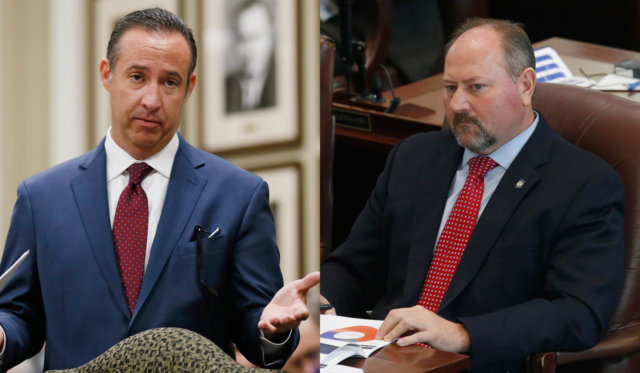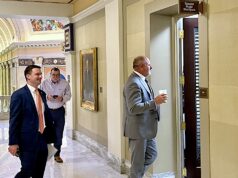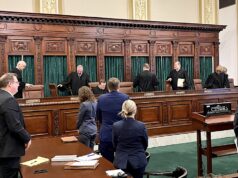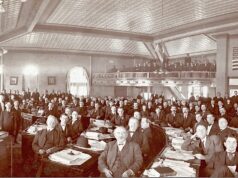
Call it the nature of the beast, but elected officials are rarely as candid in their press releases as they are behind closed doors.
With that in mind, dueling “disappointed” pronouncements Friday afternoon from House Appropriations and Budget Chairman Kevin Wallace (R-Wellston) and Gov. Mary Fallin underscore growing tension at the Oklahoma State Capitol.
Both politicians said they were “disappointed” as the Capitol prepares for a week-long closure that will elongate the special session Fallin called Sept. 25.
Fallin’s release referenced her revenue plan, which had intrigued House Minority Leader Scott Inman enough Oct. 5 to call a press conference saying a “deal” existed. But Fallin issued her own statement that day saying otherwise.
Friday, the governor’s release bemoaned a “lack of progress”:
As we end week three of the special session, I am disappointed in the lack of progress. Even though the Capitol will be closed next week because the electrical infrastructure will be replaced as part of the building’s renovation, we will continue to work to find agreement on addressing the objectives before us.
We must see progress in filling the $215 million budget hole with reoccurring revenue and funding a pay raise for teachers. Every day that goes by without an agreement is a lost opportunity to fill the hole and fund the raise. A couple of weeks ago, I handed legislators a document with plenty of ideas on how to address these goals. My hope was that we would be further down the road using that framework to negotiate a deal, but unfortunately we are not.
Asked about the “document” Fallin said she handed legislators, the governor’s communications director, Michael McNutt, said he did not have access to it.
“It’s my understanding it included the amount of cuts agencies have received the past several years,” McNutt said by email. “It also included a worksheet that contained various revenue-raising ideas and revenue estimates.”
‘These cuts are unnecessary’
In his Friday press release, Wallace is said to be “disappointed” in Fallin for ordering cuts to three health agencies — the Oklahoma Health Care Authority, the Oklahoma Department of Mental Health and Substance Abuse Services and the Oklahoma Department of Human Services — who were affected when the cigarette fee was ruled unconstitutional.
Wallace repeated Friday what he said prior to special session: that the three agencies have told him their budgets will be able to “provide full services” for at least six more weeks.
As a result, the avid deer hunter and businessman called Fallin’s order of cuts premature:
It is clear that the agencies believe they can continue to provide full services and programs to Oklahomans for several months beyond today, so I can only assume these efforts are intended to put pressure on the Legislature to pass the cigarette tax. These cuts are unnecessary at this point. Despite all the rhetoric, we have plenty of time to pass a sensible plan that addresses this budget hole in an equitable way.
But Oklahoma Secretary of Finance Preston Doerflinger sent out his own release rebutting Wallace’s statement Friday, saying the House budget chairman has a “flawed understanding” of the budgeting process:
Representative Wallace’s statement shows a lack of understanding of the basic statutory and constitutional obligations of my office and agency. It is my obligation to ensure the state is in compliance with Article 10 Section 23 of the Oklahoma State Constitution which, in part, requires state agencies to submit balanced budgets to OMES. When the Supreme Court overturned SB 845, both the Healthcare Enhancement Fund and the revenue source intended for the fund became null and void and, therefore, the appropriations also became null and void. The letter to the three agencies was to confirm that the allocations from the Healthcare Enhancement Fund would not be distributed in October and it required the agencies to submit a revised FY 18 budget reflecting that fact.
The revised budgets submitted by the agencies will be representative of the timing of the program cuts as they were conveyed to Rep. Wallace, and will ensure that the agencies’ FY 18 budgets are in balance for the total of the fiscal year. Rep. Wallace’s assertion, ‘These cuts are unnecessary at this point,’ glaringly displays that he has a flawed understanding of the budgeting process and requirements of the committee for which he is chairperson.
‘Compromises’ for a ‘Grand Bargain’?
With such press-release-based sniping driving the special session narrative into the weekend, Fallin’s reference of her “document” could be more fodder for the public to oogle.
NonDoc received a copy of a “budget presentation” that Doerflinger provided both Republican and Democrat House members Sept. 28. The document, originally a PowerPoint titled “GrandBargain.pptx”, features slides previously used by Doerflinger to explain Oklahoma’s “dire” fiscal situation to members of the Board of Equalization.
Shown a copy of the PowerPoint, McNutt said it was the first he had seen it and that the “worksheet” Fallin seemed to reference was similar to the document’s 12th page. That page lists a litany of recurring revenue ideas that Republicans and Democrats alike have included many of in their own plans.
On the page prior, the word “compromises” is noted as a “plural noun” and defined as: “An agreement or a settlement of a dispute that is reached by each side making concessions.”
